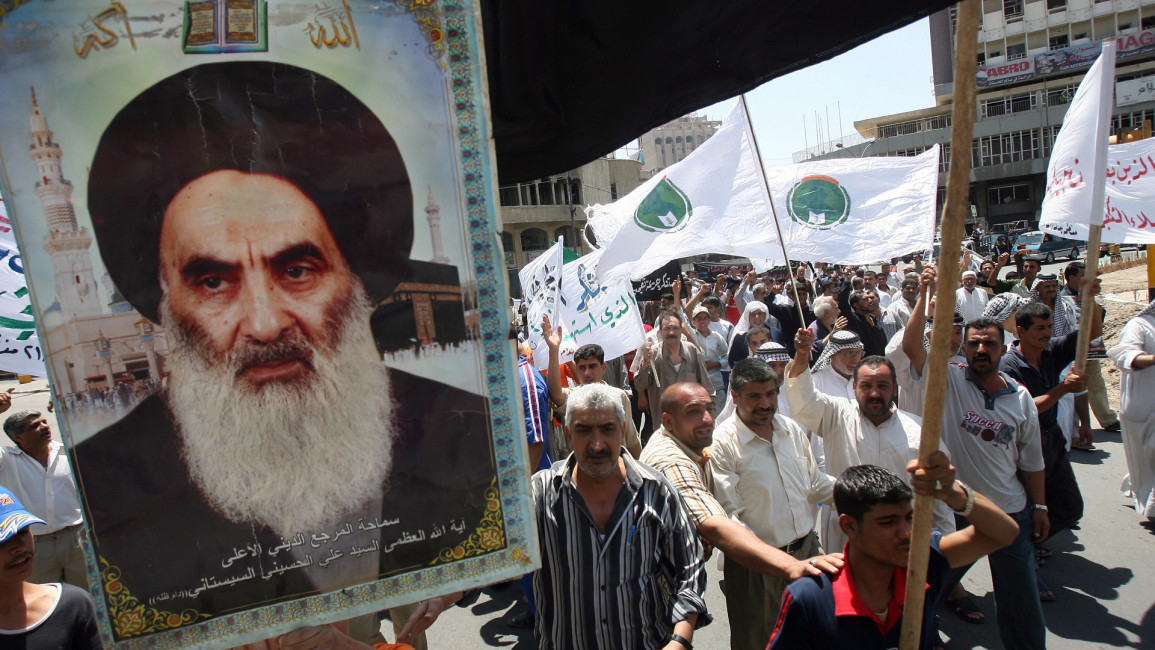Iraq’s Sistani calls for 'genuine' change
Iraq's top Shia cleric said on Friday the government must show it seeks genuine change to combat corruption and not just temporary changes to placate the nation.
In a message delivered by a representative in a Friday sermon, Grand Ayatollah Ali al-Sistani also cautioned protesters who have staged weekly rallies to press demands for reform, warning against groups seeking to hijack their movement to further other interests.
Sistani's comments, delivered in the holy Shia city of Karbala, south of Baghdad, came just hours before thousands of Iraqis were scheduled to rally in Baghdad and a string of other cities to demand better services and an end to corruption.
Tight security
| The demonstrations are civil, as the demonstrators are demanding a civil state - Imad al-Karkhi, demonstrator |
Tight security measures are in place for what is expected to be massive demonstrations in against political corruption.
A source in the Interior Ministry told al-Araby al-Jadeed that a force from the army and the police closed three routes heading toward Liberation Square and the middle of Baghdad, while the force responsible for guarding the secure government area known as the Green Zone the centre of Baghdad had closed a fourth route to the square.
The source added that an anti-riot force was deployed in the square to protect the protestors from infiltrators that could attempt to sabotage the peaceful protests.
"The security plan focuses deploying large forces on the streets and side streets leading to Liberation Square," Abd al-Salam Mohammed, the commander of a patrol on a street leading to Liberation Square told al-Araby al-Jadeed.
"Iraqi forces have been implementing this plan from the early hours of the morning, deploying forces as a screen around the square," he added.
"All those entering or leaving the square will be searched at checkpoints on the main roads."
Units have been combing the area for explosives since this morning, he said.
Followers of the radical anti-US Shia cleric Muqtada al-Sadr are also expected to join the rally in Baghdad's central Tahrir square.
Imad al-Karkhi, a participant in the demonstrations, told al-Araby al-Jadeed the demo was civil, as the demonstrations were requesting a civil state.
He added that the demonstrations would continue in the streets until this demand is met.
He said he supported the package of reforms the government had launched, saying it was a "new beginning to establish a state free of corruption and the corrupt, who have stolen Iraq’s wealth."
Lawyer Bushra Eidan said the government’s “reformist revolution” had returned hope to Iraqis that they might be able to live in a state that was united and stable, after 12 years of destruction and corruption.
Opening up the Green Zone
Meanwhile, in a further move intended to open up the government to the Iraqi public, Prime Minister Haidar al-Abadi ordered security forces to prepare to open Baghdad's heavily fortified Green Zone government and embassy area to the public, his office said Friday.
The order comes in the third week of a reform drive by Abadi aimed at combatting rampant corruption and streamlining his country’s bloated government, in response to the protests and calls from al-Sistani.
Abadi directed security forces to make "the necessary arrangements to open the Green Zone to the citizens," a statement from his office said.
If the move actually goes ahead, it is likely to face significant opposition from embassies in the Green Zone - including those of the US and Britain - due to security concerns.
While attacks have dropped in Baghdad compared with the first half of last year, bombings that are sometimes claimed by the Islamic State group are still a frequent occurrence in the capital.



